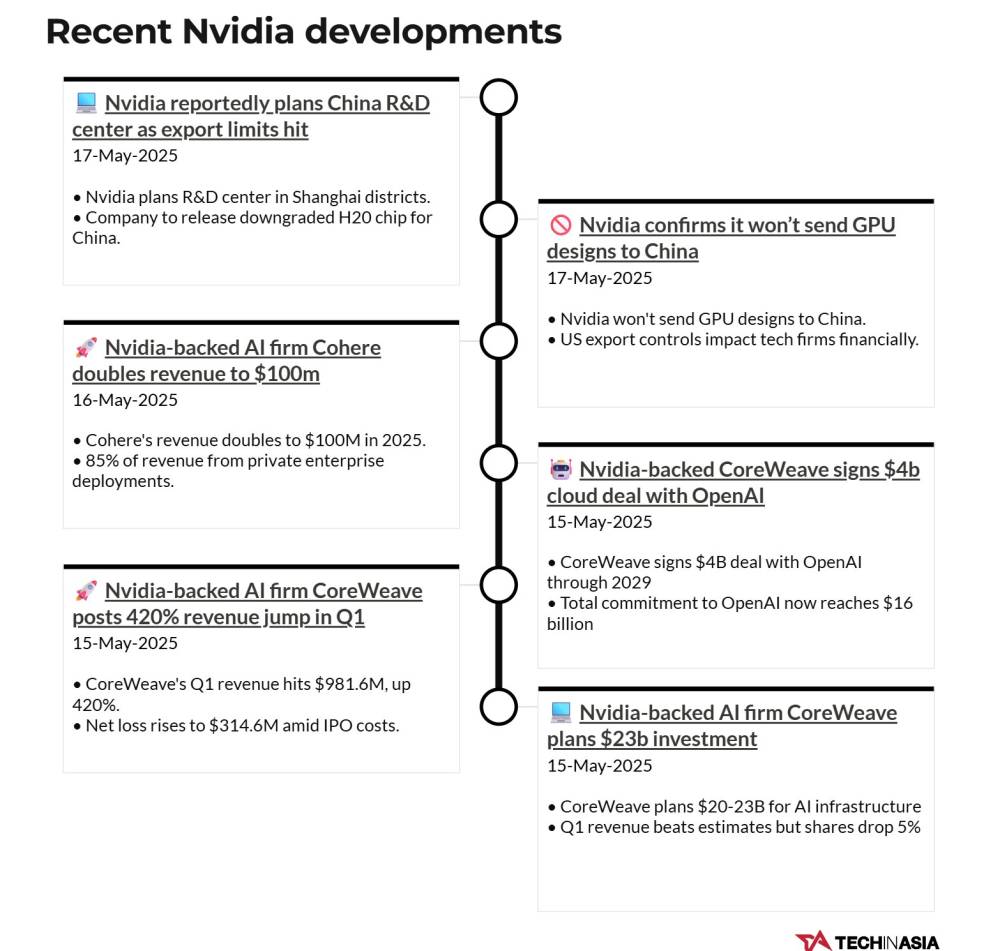
CEO Nvidia mở tiệc mừng AI Blackwell, bác bỏ tin đồn về chip tại Trung Quốc
-
Vào ngày 17/05/2025, CEO Nvidia Jensen Huang đã tổ chức một bữa tiệc tối tại Đài Bắc để kỷ niệm việc sản xuất hàng loạt hệ thống AI Blackwell – sản phẩm chủ lực mới của Nvidia.
-
Bữa tiệc có sự góp mặt của các nhà cung ứng quan trọng từ Đài Loan, thể hiện vai trò then chốt của khu vực này trong chuỗi cung ứng toàn cầu của Nvidia.
-
Huang bày tỏ sự biết ơn tới các đối tác Đài Loan, đồng thời công bố kế hoạch gặp mặt nhà sáng lập TSMC – ông Morris Chang.
-
Ông phủ nhận hoàn toàn các báo cáo cho rằng Nvidia sẽ hạ cấp chip Hopper H20 khi ra mắt tại Trung Quốc vào tháng 7, khẳng định kiến trúc chip Hopper sẽ không thay đổi.
-
Nvidia hiện đang đánh giá cách tiếp cận thị trường AI Trung Quốc trong bối cảnh các hạn chế xuất khẩu từ Hoa Kỳ.
-
Về mặt chính sách, Huang chỉ trích quyết định ngăn chặn sự lan rộng công nghệ của Mỹ là “hoàn toàn sai lầm”, phản ánh căng thẳng sâu sắc trong cuộc cạnh tranh công nghệ Mỹ-Trung.
-
Cuộc cạnh tranh này đã diễn ra từ thập niên 1980 và hiện tập trung mạnh vào các công nghệ lõi như chip bán dẫn và AI tạo sinh.
-
Chính quyền Biden từng áp dụng chiến lược ba tầng về quyền truy cập AI chip, sau đó bất ngờ thu hồi chỉ hai ngày trước khi áp dụng, khiến các công ty như Nvidia đối mặt với sự bất định lớn.
-
Nvidia phải đầu tư lớn để theo dõi chuỗi cung ứng và đảm bảo chip không bị rò rỉ sang các thị trường bị hạn chế thông qua nước thứ ba.
-
Các chuyên gia cho rằng các biện pháp kiểm soát công nghệ nên đi kèm với chiến lược ngoại giao, vì biện pháp cấm đoán đơn độc không hiệu quả.
📌 Nvidia tổ chức tiệc tại Đài Loan đánh dấu sản xuất hàng loạt hệ thống AI Blackwell, đồng thời khẳng định không thay đổi chip Hopper dù gặp rào cản xuất khẩu sang Trung Quốc. CEO Jensen Huang chỉ trích chính sách hạn chế lan tỏa công nghệ của Mỹ và nhấn mạnh cần cách tiếp cận cân bằng để phục vụ thị trường AI toàn cầu.
https://www.techinasia.com/news/nvidia-ceo-celebrates-blackwell-ai-launch-with-taiwan-suppliers
#TechinAsia
Nvidia CEO celebrates Blackwell AI launch with Taiwan suppliers
Nvidia CEO Jensen Huang hosted a dinner in Taipei on May 17, 2025, to celebrate the mass production of the company’s new Blackwell AI systems.
The event included key Taiwanese suppliers, highlighting their important role in Nvidia’s supply chain.
Earlier, Huang expressed gratitude to Nvidia’s Taiwanese partners and shared plans to meet with TSMC founder Morris Chang.
Huang denied reports of a downgraded launch for the Hopper H20 chip in China in July, stating there would be no changes to the Hopper chip architecture.
He mentioned Nvidia is assessing how to navigate the Chinese AI market amid export restrictions.
🧠 Food for thought
1️⃣ AI chip export policies reflect broader U.S.-China technological competition
Huang’s comments on Trump’s reversal of the “AI Diffusion Rule” highlight a critical tension in U.S. tech policy that has evolved over decades.
The U.S.-China technological rivalry has deep roots dating back to the 1980s, with both nations viewing AI dominance as crucial for national security and global influence today 1.
This competition has intensified particularly around key technological battlegrounds, including semiconductor manufacturing, which explains why advanced AI chips like Nvidia’s have become central to export control debates 1.
The Biden administration’s now-rescinded three-tier approach to AI chip access represented just one phase in an ongoing policy evolution that has included tariffs and increasingly targeted restrictions on Chinese access to advanced technologies 2.
Huang’s characterization of limiting the global spread of U.S. technology as “completely wrong” aligns with arguments from technology companies that overly restrictive policies may ultimately prove counterproductive to American interests.
2️⃣ Export controls create complex business challenges for global tech companies
Nvidia’s careful positioning around China access to its advanced chips demonstrates how technology companies must navigate increasingly complicated regulatory landscapes.
Huang’s precise clarification that “there will be no changes to its advanced Hopper chip architecture” while also indicating the company is “still assessing how to best serve China’s AI market” reflects the high-stakes balancing act tech companies face.
The constant evolution of export regulations, evidenced by the rapid reversal of the Biden-era rule just two days before implementation, creates significant business uncertainty for companies with global supply chains and customers 3.
Experts have argued that technology denial measures alone are insufficient for addressing concerns about China’s technology practices, suggesting the need for more coordinated diplomatic approaches that tech companies must anticipate 4.
Huang’s comments about monitoring chip movements emphasize how compliance with export controls has become a critical business function for companies like Nvidia, requiring significant resources to ensure their products don’t reach restricted markets through third countries.
Thảo luận
Follow Us
Tin phổ biến



